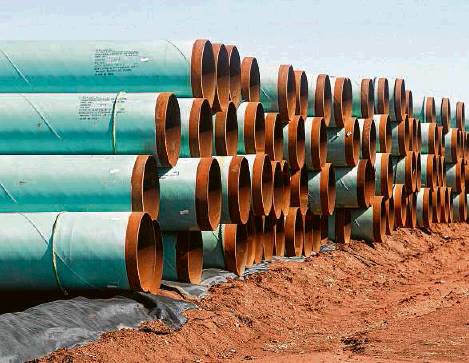Pipeline fight drags on, tempting intervention from Trump
Executives urge president to prevent states from blocking their projects
By James Osborne STAFF WRITER
WASHINGTON – Pipeline executives are urging President Donald Trump to assert federal authority over interstate pipelines and prevent states from blocking projects that run within their boundaries.
The lobbying is another front in a legal and political fight that shows no signs of ending since New York state blocked a series of pipeline projects carrying natural gas to New England from the gas-rich Marcellus shale in Pennsylvania three years ago. That has left multibillion dollar investment decisions facing more uncertainty as environmental activists target pipelines in their fight to reduce fossil fuel consumption.
Congress has been reluctant to intervene in a debate encompassing two deeply partisan issues in climate change and federal authority over state regulators. At the same time, courts have so far upheld states’ ability to use environmental law to block pipelines projects that have come under fire for their contribution to greenhouse gas emissions.
Even if Trump intervenes to overrule states, any relief would likely be a long time coming. A deluge of lawsuits from environmental groups would almost certainly follow, tying up the executive action in court for years, said Steve Weiler, a Washington energy attorney.
“It probably wouldn’t be implemented in this president’s administration,” he said. “Nothing’s going to happen quickly.”
The uncertainty around permitting pipelines comes as U.S. natural gas production shows little sign of slowing down, as hydraulic fracturing continues to unlock shale gas deposits from Texas to Pennsylvania. In November, U.S. gas production exceeded 2.6 trillion cubic feet, enough to heat 45 million U.S. homes for a year and up 30 percent from five years ago.
But the climate change movement is also gaining momentum after a series of dire forecasts, including one from the federal government last year that predicted that crop failures, wildfires and flooding would shrink the U.S. economy by 10 percent by 2100 if greenhouse gas emissions are left unchecked.
In a letter to Federal Energy Regulatory Commission Chairman Neil Chatterjee this week, Cabot Oil and Gas CEO Dan Dinges, a partner in one delayed pipeline through New York, criticized the commission for not doing more to get pipeline construction moving.
“The gamesmanship of the state of New York has never been more legally suspect,” he wrote. “We urge you and your fellow Commissioners not to lose sight of the more substantial contributions to energy security and reliability in the region that can be achieved by decisive action on needed pipelines.”
Nationwide, pipelines have largely moved through the state permitting process at their usual pace, analysts say. But the industry fears that other states might follow New York Gov.Andrew Cuomo’s opposition to pipelines. A wave of Democratic governors elected in November campaigned on the pledge to shift their states’ energy sector away from fossil fuels.
The pipeline industry has lobbied Congress to limit states’ ability to block pipeline projects, but outside of abill introduced last year by Sen. John Barrasso, R-Wyo., lawmakers have shown little interest.
“You have a tug of war here. The fact we would contend is states are using their (environmental) jurisdiction this way is not what’s intended,” said Don Santa, president of the Interstate Natural Gas Association of America. “The other side of the coin is those who would say this is about state authority, and they don’t want it taken away.”
In the court room, decisive victories have been hard to come by.
Last year, environmentalists scored a win when the Supreme Court declined to hear pipeline companies’ challenge of New York’s rejection of the 125-mile Constitution Pipeline project in 2016, which would have run from Pennsylvania to upstate New York. That left in place a ruling from the 2nd Circuit Court of Appeals upholding New York’s decision.
But earlier this month, the 2nd Circuit told New York officials that they had failed to explain their rationale for rejecting another pipeline project, the 96-mile Northern Access, which would also run from Pennsylvania to New York. However, the ramifications are unclear outside the fate of that single pipeline project.
Industry attorneys say it’s asign judges are starting to restrain New York in their reliance on water pollution laws to stop pipelines. Environmentalists say New York’s attorneys just need to do a better job explaining their legal reasoning.
Either way, the ruling did not address the larger question: Is climate change grounds for a state to reject pipeline and related projects under the Clean Water Act, the landmark 1972 law protecting rivers and coastlines?
Environmental attorneys argue the gas transported by pipelines increases greenhouse gas emissions, which leads to more intense storms. That drives more runoff into rivers and streams, carrying more pollutants into those waters, and putting pipelines squarely under states’ authority. But so far, there has been no clear court ruling on that point, said Moneen Nasmith, a staff attorney at the activist group Earthjustice. james.osborne@chron.com twitter.com/oborneja
